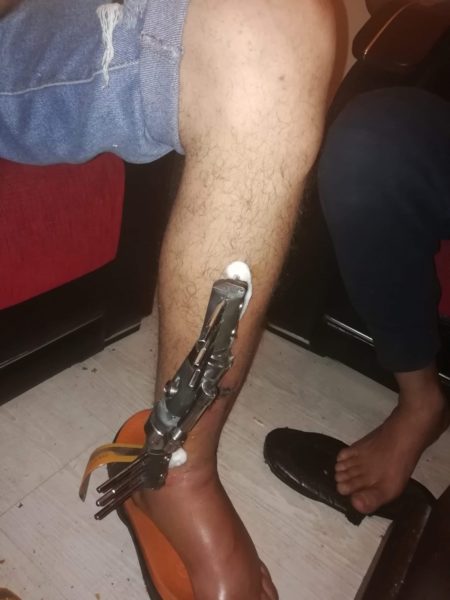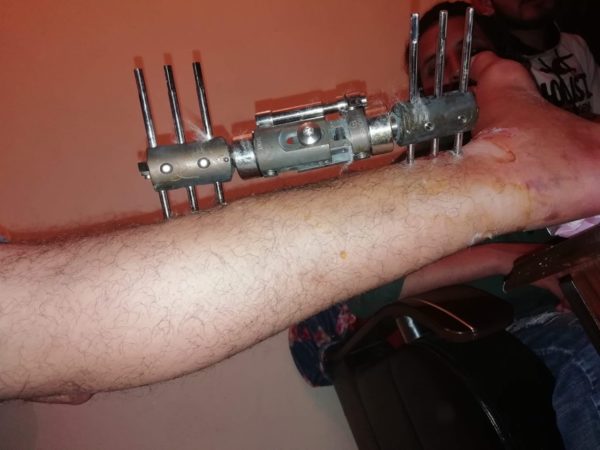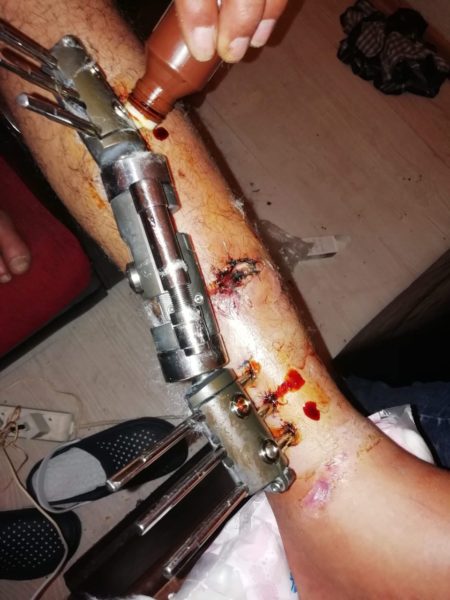The respondent re-entered Greece from Turkey on 26th April 2020 after being violently pushed back from Thessaloniki in the days before (see report). He is a man from Morocco, and traveled in a small transit group with other North Africans, attempting to return to Thessaloniki where he was staying prior to the first pushback.
The respondent traveled westwards with the group for several days. On 2nd May 2020, close to Xanthi on a stretch of B road near the motorway, the group were subject to a car crash by a Greek driver who swerved to hit them. The respondents legs were swiped in the incident, causing a severe break.
“it wasn’t like an accident like he tried to do that”
The respondent stated his friends were close behind him, but were fortunately not hit by the car (though it seems the driver intended to hit all of them). The friends of the victim tried to help him, but it was a very severe injury, so they were forced to stop members of the public and ask someone to call the emergency services. Eventually a driver helped them to do this. They waited with the injured respondent, and then hid nearby, scared that they would be caught and pushed back if the police found them at the crash site.
The Greek police arrived but did not seem interested in investigating the attack or arresting the driver. They just simply called the ambulance to attend, which came after a little while and took the respondent to a hospital in Xanthi. The officers took the respondent’s clothes, and he was dressed in hospital garments. The respondent described being treated well in the hospital and that one of the doctors could speak German with him, and was reassuring.He was operated for the injury and fitted with bolted metal splints in his lower right shin.


On 12th May 2020, the police arrived and took the respondent out of the hospital, despite him still having large sections of exposed metal bolted in the leg (and requiring follow up operations). The officers loaded him into a windowless vehicle and took him to what the respondent described as a “jail”, where he was held for one and a half days.
The respondent described the detention space as having cells with around six person per room. He was alone in one room because of his injury, but he could here many others were being held in the facility. On the second day he was removed by Greek authorities who took him to another detention space, which he termed “the commandos place” because it was run by masked men in green military uniform.
The respondent said this place was heavily guarded. The location was in remote farmland and he couldn’t see many houses nearby. The respondent says that through the bars of the cell he was held in he could see the police come several times, and take approximately 30 people at a time in truck. The respondent saw around 80 people being held at this site, composed of multiple nationalities including Eritrea, Somalia, Syria and Palestine. There were also many children between 6-7 years old, and old people and he met at least two single women from Morocco.
The respondent described the setting of the second detention space as “horrible” and alleged it to be a big farmyard with stables for animals. He said he was held in one of these stables as a cell, alongside 50-60 other people. All were being held without shoes, and many had their clothes removed before arriving.
A truck came and loaded around 30 people, including the respondent and drove them to the Evros river. Because of his severe injuries, the respondent had to be carried to the car.
At the river he was unloaded and four people from the pushback group helped him, holding his legs and arms, and placed him in the boat. He crossed with these four people to the Turkish side
Describing this incident in comparison with the pushback he had suffered a week earlier, the respondent said:
“the same commandos, the same tactic, the same plan, the same guns, just different place where they crossed”
After two days of sleeping in the forest on the Turkish side the respondent along with others met people who had been pushed back from Paranesti Drama Pre-removals Centre. While the Turkish police passed by and refused to help them, they managed to get a local to drive them to Istanbul (though they were charged 500 euros).
At the time of interview, the respondent remained essentially bedridden, unable to walk. He stayed with friends in rented accommodation and was forced to carry out his own wound dressings with the help of others who collected bandages and iodine for him from the pharmacy.

